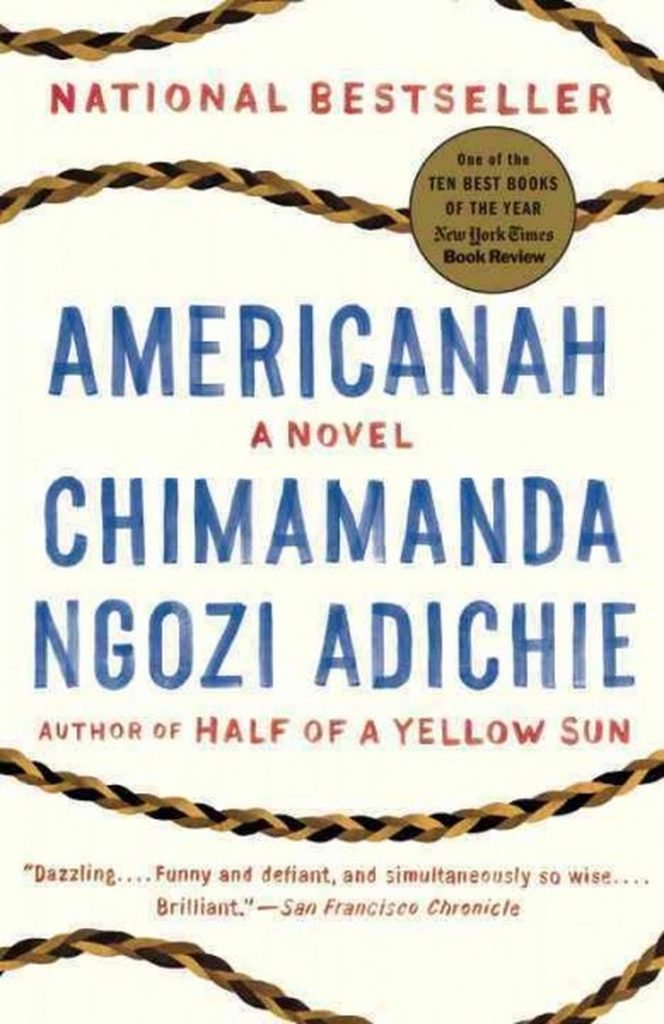by Sam Holmes
I haven’t had the best experiences with required summer readings. An ever growing pile of books haunted me throughout the Julys and Augusts of my high school career. Moby Dick traveled with me to the beach, Taming of the Shrew was in my purse during the summer carnival, and Othello was an unwelcomed guest at my July family reunion. With the exception of Moby Dick, these books were not unpleasant to read. However, part of me resented the fact that these pieces were making unwanted appearances in my coveted vacation time. The lack of diversity made matters worse. My summers were filled with works from the western canon. It seemed that my school mainly valued the works of white males. I assumed that my future college would be the same way. I was wrong. My required reading book for summer 2014 was Chimamanda Ngozi Adichie’s Americanah. It was an amazing change of pace.
and Augusts of my high school career. Moby Dick traveled with me to the beach, Taming of the Shrew was in my purse during the summer carnival, and Othello was an unwelcomed guest at my July family reunion. With the exception of Moby Dick, these books were not unpleasant to read. However, part of me resented the fact that these pieces were making unwanted appearances in my coveted vacation time. The lack of diversity made matters worse. My summers were filled with works from the western canon. It seemed that my school mainly valued the works of white males. I assumed that my future college would be the same way. I was wrong. My required reading book for summer 2014 was Chimamanda Ngozi Adichie’s Americanah. It was an amazing change of pace.
First and foremost, Americanah’s protagonist, Ifemelu, is a magnetic character. The multi-faceted nature of her personality appears throughout her experience. Ifemelu, who is occasionally referred to as Ifem, is not easy to describe. This is one of the novel’s greatest strengths. Ife is haughty, insecure, judgemental, vulnerable, grateful, blunt, loving, wise, bold, manipulative, and compassionate. Just to clarify, these are only the traits from the the first half of the novel. As the story progresses, so do Ifem’s characteristics.
Americanah chronicles Ifem’s journey from Nigeria to the United States as well as her eventual return to Nigeria. This major transition is the event which inspires such a three dimensional character. In the years leading up to her departure, Ifem experiences highs and lows that are incredibly relatable. As an adolescent in Nigeria, Ifem begins to ask questions about her surroundings and the people within them. Topics such as religion, body image, teenage relationships, sexuality, gender dynamics, and family pressure all leave their mark on the poignant protagonist’s early years. Amid these events, Ifem never stops asking questions. When she witnesses societal wrongs in Nigeria, such as government corruption or social hierarchies, Ifemelu expresses her disapproval.
This pattern continues when Ifemelu arrives in America. However, race becomes a more pivotal topic in her life. As a Nigerian in America, Ifem both experiences and observes American racism. Ifem is pressured to perm her hair in order to be more appealing to employers. She is refused service at beauty salons. Her peers expect her to be the mouthpiece for black people during classroom discussions. She encounters men who aren’t attracted to her because of her race, as well as those who are drawn to her because of her complexion. Feminism is a central topic as well. In both Nigeria and America, Ifemelu takes note of the ways in which women are expected to behave. Ifem records her adventures and misadventures in her blog, Raceteenth Or Various Observations About American Blacks (Those Formerly Known As Negroes) By A Non-American Black.
After finishing this book, I understand why Americanah was selected for the incoming class of first years. It is honest in the most necessary way. It is a story composed of layers and literary labyrinths. It spans multiple continents, decades, genders, and ideologies. Racism, sexism, classism, shadeism, and numerous other ‘isms’ are confronted throughout the pages of Americanah. It provides a view into these problems that any people may have never discovered otherwise. Those who have endured these problems can find comfort and validation in the Adichie’s words. These systems of oppression are highlight in her work. People who have never faced such injustices can begin to realize how prevalent and robust these discriminatory frameworks are. More importantly, this narrative displays why such practices must come to an end.
Even if my school hadn’t mandated Americanah, I would have read it anyway. Before reading the first page, I had a feeling that I would enjoy this story based off of its author. I admire Chimamanda. After hearing her definition of the word feminist in Beyonce’s song,Flawless, I began searching for more information about her. She is a candid activist whose wit, insight, and sense of humor translates beautifully into her work.

I LOVED this book so much. It was one of those books that really resonated with me and left a huge impact on my views of this world. I probably think about this book at least once a week.
Great review!
[…] Need a book to read? At the Spark Movement, Sam Holmes reviews Americanah, Chimamanda Ngozi Adichie’s much lauded book about race in the United States. […]